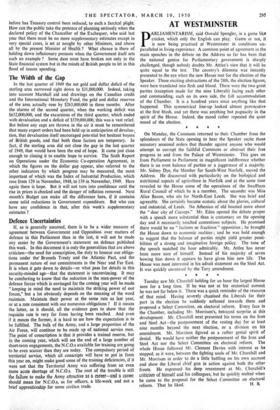Defence Uncertainties
If, as is generally assumed, there is to be a wider measure of agreement between Government and Opposition over matters of defence in this Parliament than in the last, it will not be made any easier by the Government's statement on defence published this week. In this document it is only the generalities that are above criticism—the need for conscription, the duty to honour our obliga- tions under the' Brussels Treaty and the Atlantic Pact, and the permanent nature of our commitments in the Near and Far East. It is when it gets down to details—or what pass for details in this security-minded age—that the statement is unconvincing. It may be comforting to know that the reduction in the man-power of the defence forces which is envisaged for the coming year will be made "keeping in mind the need to maintain the striking power of our forces," but a lot obviously depends on the meaning of the word maintain. Maintain their power at the same rate as last year, or at a rate consistent with our numerous obligations ? If it means the latter, as it should, all the evidence goes to show that the requisite rate is very far from having been reached. And even if it means the former, it is hard to see how the expectation is to be fulfilled. The bulk of the Army, and a large proportion of the Air Force, will continue to be made up of national service men. The point of conscription is that it provides a trained reserve, but in the coming year, which will see the end of a large number of short-term engagements, the N.C.O.s available for training are going to be even scarcer than they are today. The compulsory period of territorial service, which all conscripts will have to put in from this year on, might make good some of the training deficiencies, if it were not that the Territorial Army was suffering from an even more acute shortage of N.C.O.s. The root of the trouble is still the failure to make the Army attractive as a career—and a career should mean for N.C.O.s, as for officers, a life-work and not a brief apprenticeship for some civilian trade.


































 Previous page
Previous page